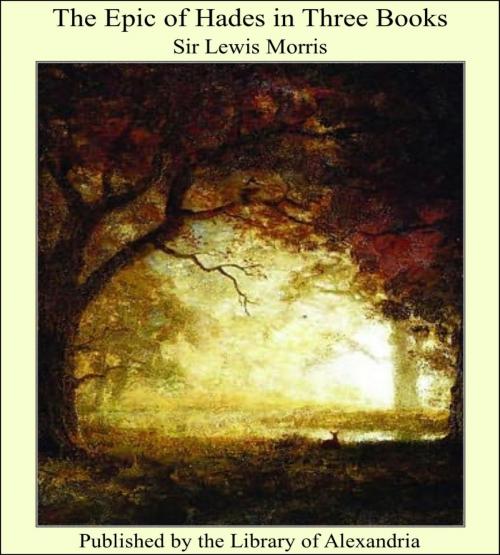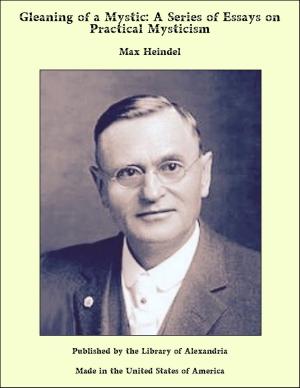The Epic of Hades in Three Books
Nonfiction, Religion & Spirituality, New Age, History, Fiction & Literature| Author: | Sir Lewis Morris | ISBN: | 9781465510860 |
| Publisher: | Library of Alexandria | Publication: | March 8, 2015 |
| Imprint: | Language: | English |
| Author: | Sir Lewis Morris |
| ISBN: | 9781465510860 |
| Publisher: | Library of Alexandria |
| Publication: | March 8, 2015 |
| Imprint: | |
| Language: | English |
TARTARUS. In February, when the dawn was slow, And winds lay still, I gazed upon the fields Which stretched before me, lifeless, and the stream Which laboured in the distance to the sea, Sullen and cold. No force of fancy took My thought to bloomy June, when all the land Lay deep in crested grass, and through the dew The landrail brushed, and the lush banks were set With strawberries, and the hot noise of bees Lulled the bright flowers. Rather I seemed to move Thro' that weird land, Hellenic fancy feigned, Beyond the fabled river and the bark Of Charon; and forthwith on every side Rose the thin throng of ghosts. First thro' the gloom Of a dark grove I strayed—a sluggish wood, Where scarce the faint fires of the setting stars, Or some cold gleam of half-discovered dawn, Might pierce the darkling pines. A twilight drear Brooded o'er all the depths, and filled the dank And sunken hollows of the rocks with shapes Of terror,—beckoning hands and noiseless feet Flitting from shade to shade, wide eyes that stared With horror, and dumb mouths which seemed to cry, Yet cried not. An ineffable despair Hung over them and that dark world and took The gazer captive, and a mingled pang Of grief and anger, grown to fierce revolt And hatred of the Invisible Force which holds The issue of our lives and binds us fast Within the net of Fate; as the fisher takes The little quivering sea-things from the sea And flings them gasping on the beach to die Then spreads his net for more. And then again I knew myself and those, creatures who lie Safe in the strong grasp of Unchanging Law, Encompassed round by hands unseen, and chains Which do support the feeble life that else Were spent on barren space; and thus I came To look with less of horror, more of thought, And bore to see the sight of pain that yet Should grow to healing, when the concrete stain Of life and act were purged, and the cleansed soul, Renewed by the slow wear and waste of time, Soared after æons of days. They seemed alone, Those prisoners, thro' all time. Each soul shut fast In its own jail of woe, apart, alone, For evermore alone; no thought of kin, Or kindly human glance, or fellowship Of suffering or of sin, made light the load Of solitary pain. Ay, though they walked Together, or were prisoned in one cell With the partners of their wrong, or with strange souls Which the same Furies tore, they knew them not, But suffered still alone; as in that shape Of hell fools build on earth, where hopeless sin Rots slow in solitude, nor sees the face Of men, nor hears the sound of speech, nor feels The touch of human hand, but broods a ghost, Hating the bare blank cell—the Other self, Which brought it thither—hating man and God, And all that is or has been. A great fear And pity froze my blood, who seemed to see A half-remembered form
TARTARUS. In February, when the dawn was slow, And winds lay still, I gazed upon the fields Which stretched before me, lifeless, and the stream Which laboured in the distance to the sea, Sullen and cold. No force of fancy took My thought to bloomy June, when all the land Lay deep in crested grass, and through the dew The landrail brushed, and the lush banks were set With strawberries, and the hot noise of bees Lulled the bright flowers. Rather I seemed to move Thro' that weird land, Hellenic fancy feigned, Beyond the fabled river and the bark Of Charon; and forthwith on every side Rose the thin throng of ghosts. First thro' the gloom Of a dark grove I strayed—a sluggish wood, Where scarce the faint fires of the setting stars, Or some cold gleam of half-discovered dawn, Might pierce the darkling pines. A twilight drear Brooded o'er all the depths, and filled the dank And sunken hollows of the rocks with shapes Of terror,—beckoning hands and noiseless feet Flitting from shade to shade, wide eyes that stared With horror, and dumb mouths which seemed to cry, Yet cried not. An ineffable despair Hung over them and that dark world and took The gazer captive, and a mingled pang Of grief and anger, grown to fierce revolt And hatred of the Invisible Force which holds The issue of our lives and binds us fast Within the net of Fate; as the fisher takes The little quivering sea-things from the sea And flings them gasping on the beach to die Then spreads his net for more. And then again I knew myself and those, creatures who lie Safe in the strong grasp of Unchanging Law, Encompassed round by hands unseen, and chains Which do support the feeble life that else Were spent on barren space; and thus I came To look with less of horror, more of thought, And bore to see the sight of pain that yet Should grow to healing, when the concrete stain Of life and act were purged, and the cleansed soul, Renewed by the slow wear and waste of time, Soared after æons of days. They seemed alone, Those prisoners, thro' all time. Each soul shut fast In its own jail of woe, apart, alone, For evermore alone; no thought of kin, Or kindly human glance, or fellowship Of suffering or of sin, made light the load Of solitary pain. Ay, though they walked Together, or were prisoned in one cell With the partners of their wrong, or with strange souls Which the same Furies tore, they knew them not, But suffered still alone; as in that shape Of hell fools build on earth, where hopeless sin Rots slow in solitude, nor sees the face Of men, nor hears the sound of speech, nor feels The touch of human hand, but broods a ghost, Hating the bare blank cell—the Other self, Which brought it thither—hating man and God, And all that is or has been. A great fear And pity froze my blood, who seemed to see A half-remembered form















